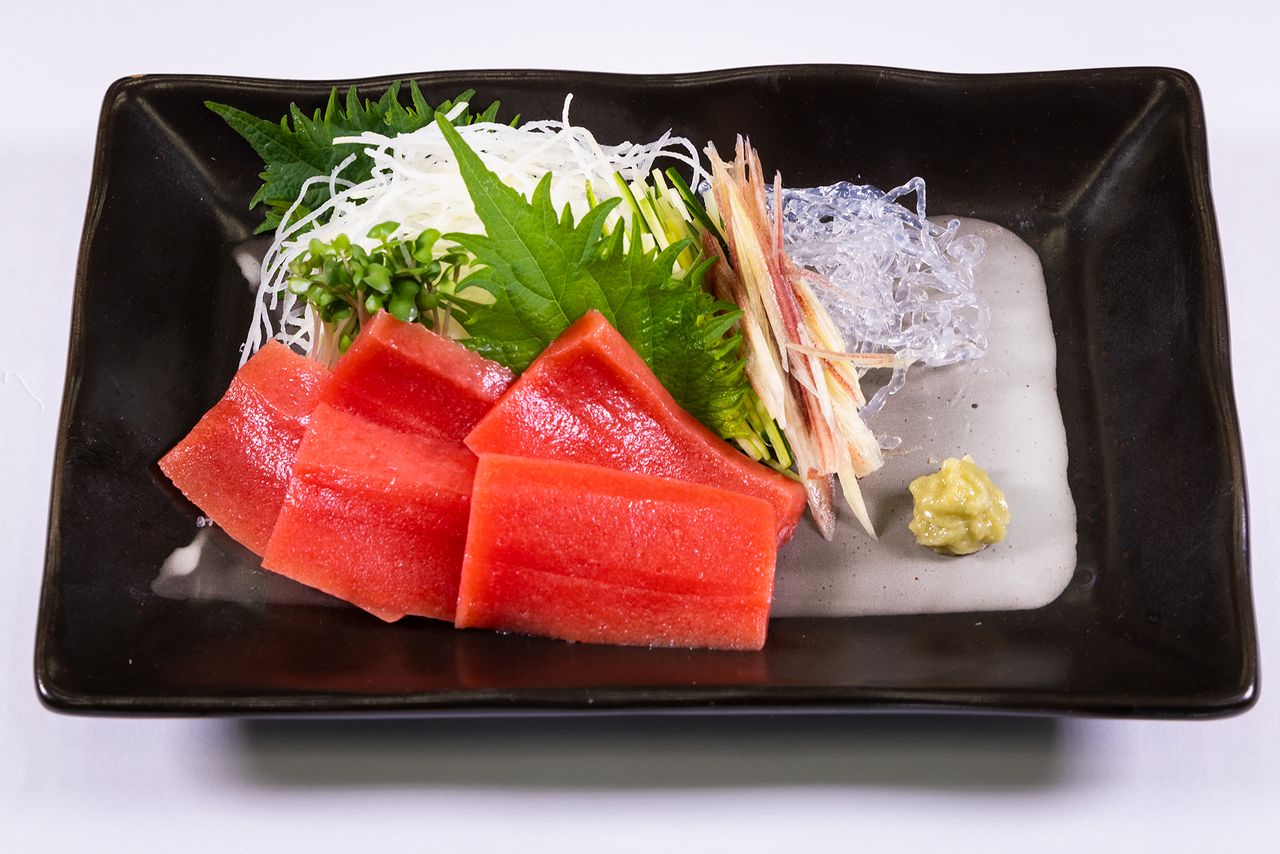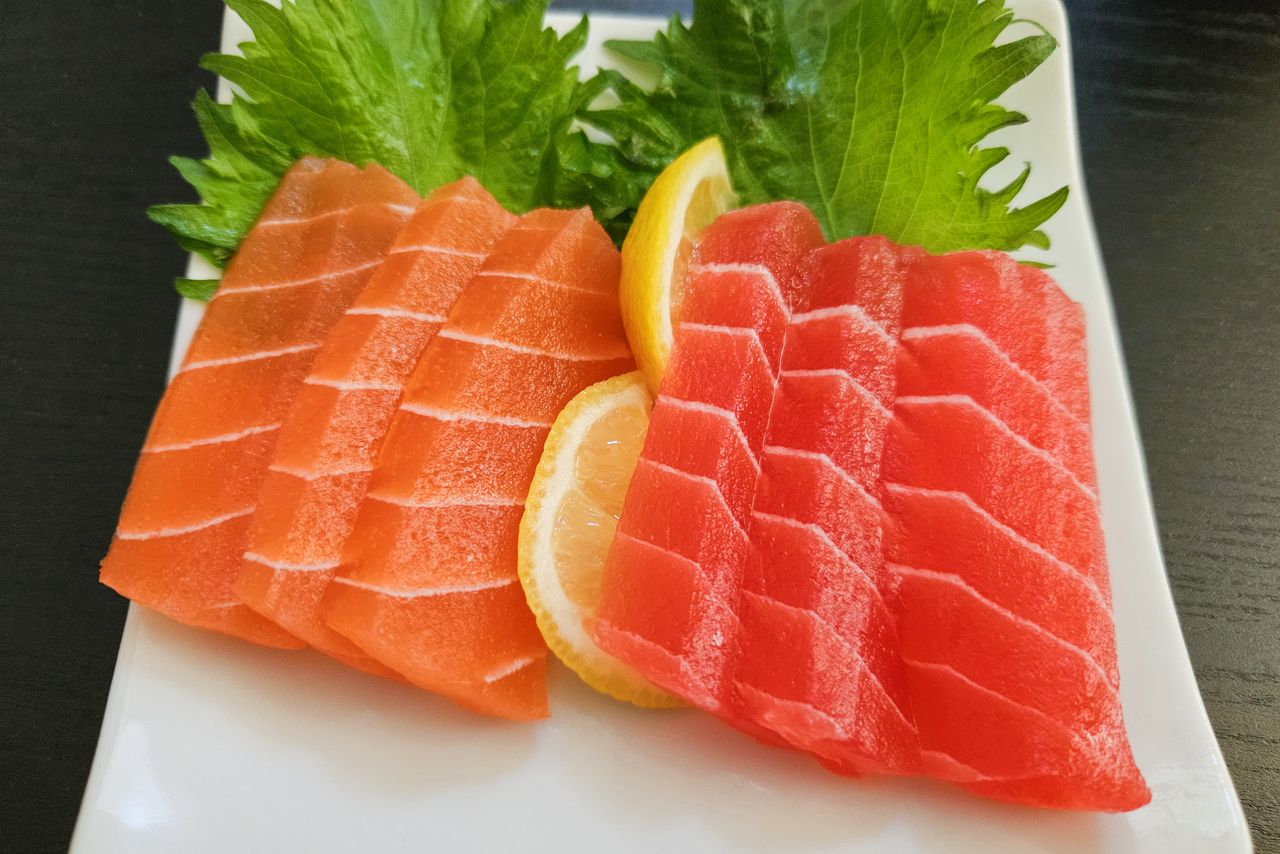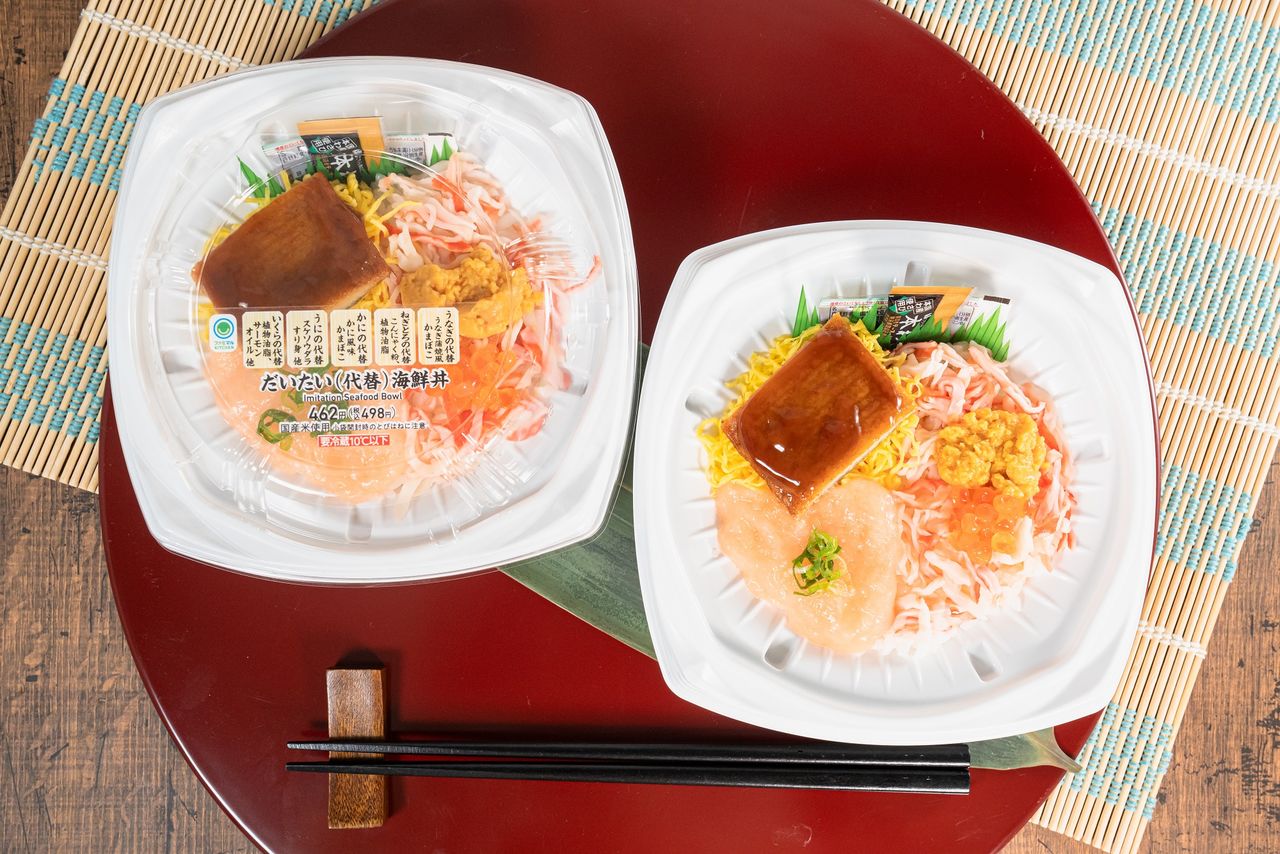
Plant-Based Sashimi: Faux Seafood Options Gaining Acceptance Among Consumers
Guideto Japan
Lifestyle Food and Drink- English
- 日本語
- 简体字
- 繁體字
- Français
- Español
- العربية
- Русский
Just Like the Real Thing
A serving of lean tuna sashimi—the perfect accompaniment to a cup of sake. Garnished with daikon threads, perilla leaf, and wasabi, it is a mouthwatering delight. What I have been served, though, is not fish, but a plant-based substitute created from powdered konnyaku (made from the konjac potato) and other ingredients.

This plant-based tuna looks and tastes just like the real thing. (© Nippon.com)
The faux sashimi was created by food maker Nippon Ham. Watanabe Ken’ichi, who was in charge of developing the product, explains that the his team focused on faithfully reproducing the mouthfeel and distinct scent of fresh tuna while ensuring its compatibility with wasabi and soy sauce. A quick bite confirms that it has just the right texture and chewiness, with the flavor of tuna spreading through my mouth. Watanabe says working out the right balance of ingredients to achieve a suitable texture and firmness posed a steep challenge. If it was too hard it would have a konnyaku-like texture, and if it was too soft it would fall apart.
The product, aimed at commercial users, went on the market in April of this year. Hotels and restaurant chains have shown interest in the imitation seafood, and if demand increases, Nippon Ham plans to ramp up production. The sashimi, which is sold frozen, will keep in a freezer for one year, making it an attractive option for food service providers.
Sustaining Marine Resources
Meeting the United Nations’ Sustainable Development Goals is one reason why food manufacturers like Nippon Ham are branching out into fish-based alternatives. Given the interest in Japanese cuisine and more healthful eating globally, demand for fish is increasing even as wild fish catches have plateaued. Data from the UN’s Food and Agriculture Organization paints a bleak picture, showing that the portion of fish stocks that are at sustainable levels have plummeted from 90% in 1974 to 65% in 2019, offering clear proof that overfishing and other factors are having a dire impact on marine resources.
In Japan, fisheries have seen poor catches of mainstay species like Pacific saury and salmon, and hauls overall remain at record-low levels. Such dire circumstances are driving interest in seafood alternatives, similar to what is already happening for meat.
Nippon Ham started working on developing plant-based seafood products in 2023. It created an alternative to tuna sashimi, a staple seafood offering, successfully commercializing the product after six months of research and development. In its press release, the company says it will broaden its offering of similar products, citing growing interest in the SDGs among the public and concerns of food poisoning and mercury contamination among certain segments of the population, including pregnant women. It is currently developing alternatives of other kinds of fish. Given plummeting catches of favorites like squid and Pacific saury, plant-based versions are likely in the offing.

Nippon Ham’s plant-based tuna sashimi comes in vacuum-sealed packs and can be sliced to dinners’ tastes. (© Nippon.com)
Azuma Foods
Another manufacturer offering plant-based products is Mie Prefecture-based Azuma Foods. The firm made a name for itself with its takowasabi, an umami-rich dish made from fermented octopus and wasabi that has become a staple appetizer at izakaya. It entered the plant-based seafood market earlier in 2021 with its Future Fish brand of sashimi products.
Leveraging its reputation as a seafood processor, Azuma Foods began developing plant-based alternatives in response to rising seafood prices as catches diminish, with an eye to the long-term sustainability of fisheries. It offers tuna, salmon, and squid varieties under its Future Fish banner. Using konnyaku powder as the basic ingredient, the company claims that its tuna and salmon sashimi, complete with pale sinews, are so lifelike that consumers often do not even realize that they are eating a plant-based product.

A serving of Future Fish salmon and tuna. (© Kawamoto Daigo)
Future Fish uses no animal-derived extracts and is certified as vegan by the Japanese non-profit VegeProject Japan. Azuma Foods says this designation had helped the brand gain a foothold overseas, with the company seeing rising demand in countries like the United States and Canada. In Japan, customers include vegetarian restaurants and temples offering Buddhist vegetarian cuisine. The company is working to expand its product lineup and plans to offer a marinade-flavor of products.
Convenience Store Imitation Seafood Bowl
Convenience store giant FamilyMart has joined the faux fish market, offering an imitation seafood bowl at select stores in the Tokyo area. The product consists of imitation sea urchin, crab, salmon roe, chopped tuna with long onion, and grilled eel made from alternative ingredients like fish paste, soy beans, and konnyaku.
The seafood bowl is available only for a limited time, but FamilyMart says it intends to explore more ways of using plant-based ingredients to help sustain marine resources. An increasing range of companies can be expected to jump on the imitation fish bandwagon as consumer awareness of environmental issues and healthy eating increases.

Family Mart’s imitation seafood bowl is an appetizing and reasonably-priced meal option. (© FamilyMart)
(Originally published in Japanese. Banner photo: Nippon Ham’s plant-based tuna. © Nippon.com.)